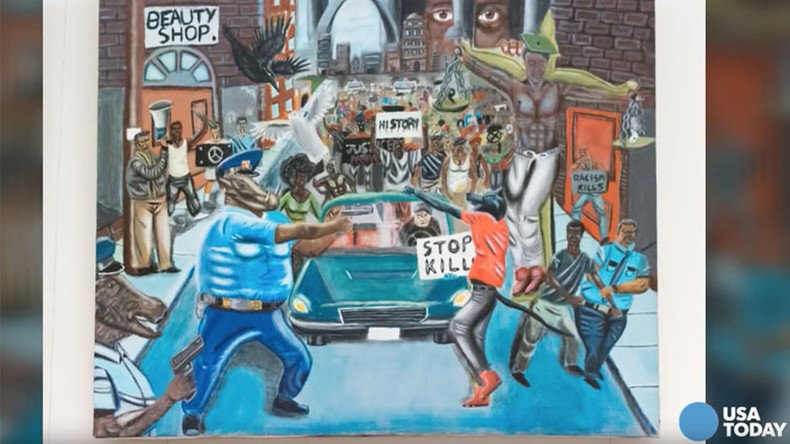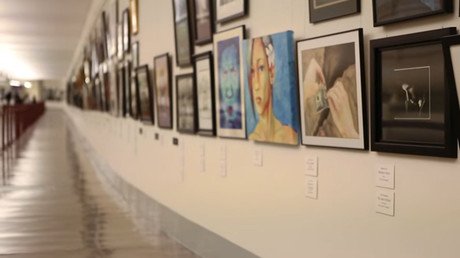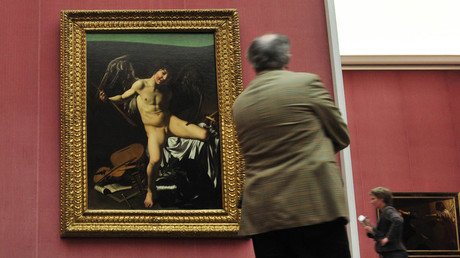Congressman sues over removal of cops-as-pigs painting from US Capitol

The removal of a painting that depicted cops as pigs from a US Capitol violated the free speech rights of a high school student, according to the Missouri congressman who has filed a federal lawsuit over the matter.
Representative William Lacy Clay (D-Missouri) filed a federal lawsuit against the Architect of the Capitol, claiming that the painting’s removal violated the First Amendment rights of David Pulphus, its author and a former student at Cardinal Ritter College Prep High School in St. Louis.
The painting, "Untitled #1," is an interpretation of the unrest that took place following the August 2014 fatal shooting of Michael Brown, an unarmed 18-year-old black man, by police in Ferguson, Missouri. The painting depicts two police officers as pig-like animals with tusks. One is pointing a gun at a protester.
Joining Rep. Lacy Clay at the E. Barrett Prettyman U.S. Court House as he files a lawsuit to protect the #1A rights of a student artist. pic.twitter.com/xN3RpmRcyP
— Rep. Jamie Raskin (@RepRaskin) February 21, 2017
The suit names Architect of the Capitol Stephen Ayers as the defendant, the Post-Dispatch reported. The suit does not seek damages, but will ask for "declaratory and injunctive" measures, according to Clay's spokesman, Steven Engelhardt.
"Seven months after being displayed as part of a public exhibit, a deluge of alternative right media, aided by the unauthorized actions of certain reactionary members of Congress, deprived Mr. Pulphus of his constitutionally guaranteed 1st Amendment Right of Free Expression," Clay said in a statement, quoted by the Post-Dispatch.
Clay, whose district covers Ferguson, said that he "is seeking an appropriate remedy through this federal litigation and he is proud to defend both the fundamental rights of his constituent and the First Amendment."
Pulphus’ painting was a winner of the annual Congressional Art Competition and placed next to hundreds of other student paintings in a tunnel that connects the Cannon House office building with the US Capitol.
In addition to showing police officers as pigs, the painting shows protesters holding signs such as “History,” and “Racism Kills.” On the right side of the painting, a crucified man in a graduation cap holds the scales of justice in his hands.
The painting ran afoul of Republican members of Congress, including Rep. Duncan Hunter (R-California), who removed the painting himself. Clay then returned the painting to the tunnel wall. The majority members then took their grievances to the Architect of the Capitol Ayers.
If Speaker Ryan is going to censor art, how about art glorifying Confederate leaders who betrayed the Union? #1Ahttps://t.co/02mWGD59owpic.twitter.com/LLzqkDMzRm
— Rep. Jamie Raskin (@RepRaskin) February 21, 2017
Rep. Dave Reichert (R-Washington) complained to Ayers, stating "with any competition there are rules, and these rules exist for a reason. This painting hung in clear defiance to those rules and was a slap in the face to the countless men and women who put their lives on the line everyday on behalf of our safety and freedom."
MO. Rep. William Lacy Clay - Encouraging CULTURAL ROT by filing a Fed lawsuit regarding removal of COPS AS PIGS painting from Capitol Hill.💩 https://t.co/EHZfwPDV5f
— CharlotteS (@Incorrigible2) February 21, 2017
Last month, Ayers determined that the painting violated Capitol rules that prohibit controversial topics and ordered it permanently removed from the display. Clay then hung the painting in his own congressional office.
Rep. Hunter told the Post-Dispatch that "it kind of strikes the same nerve as when the guys came home from Vietnam, and they called them baby killers," adding that Capitol Hill police officers thanked him for his actions.
Even though we disagree, we're still friends @LacyClayMO1pic.twitter.com/rzID8j5ZHm
— Rep. Duncan Hunter (@Rep_Hunter) January 10, 2017
Discontent in Ferguson that followed Brown’s shooting – and later in the year, a grand jury decision not to indict the officer involved – was met with a militarized police response. Brown's killing set off nationwide protests of police violence against minority communities.
Pulphus, who now attends college, has only discussed the controversy through an opinion piece that ran last month in the Post-Dispatch.
"Why would a young student with hope, promise and purpose perceive our community and the police in such a manner?" he wrote.
"The officials did not take into account the role militarization of policing has played in African-American communities (including Ferguson and St. Louis) or the way 'stop and frisk' and pretext stops invade the privacy of African-American citizens. These are things that we have personally experienced."














